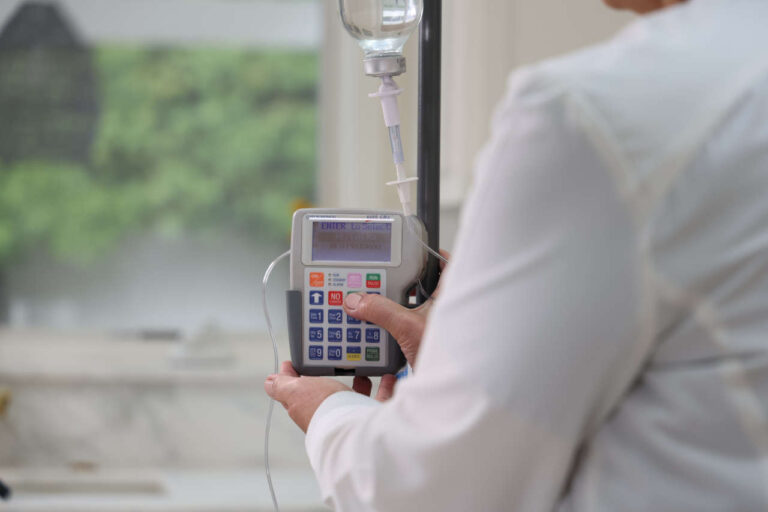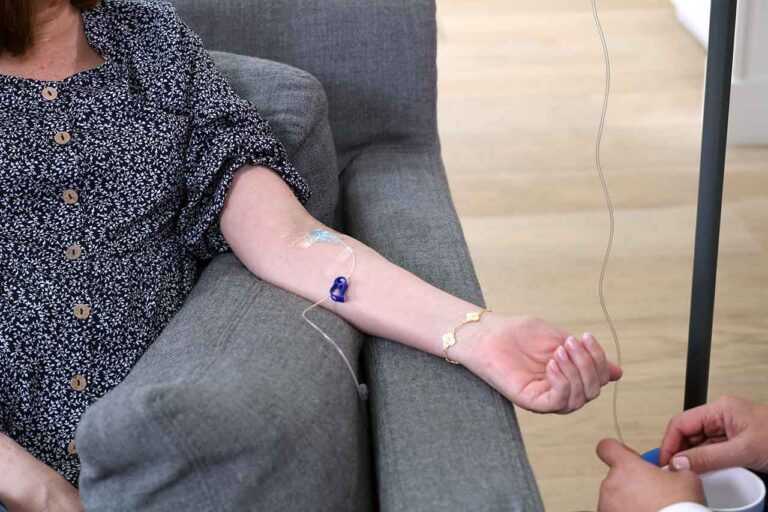
Patients who suffer from autoimmune diseases may find it difficult to manage their illness since, in this condition, the immune system misbehaves and begins to attack and kill the body’s healthy cells, including RBCs, trombocite, and nerve cells. In turn, this results in compromised cell operations and serious symptoms. Since there is no known treatment for autoimmune disorders, doctors frequently suggest IVIG therapy as a component of their overall treatment strategy to control the illness’s symptoms and enhance patients’ quality of life.
Consultați un specialist în imunoglobulină (IVIG)
Cea mai bună perfuzie IVIG la domiciliu | Obțineți asistență pentru tratamentul IVIGIVIG therapy aims to normalize the compromised immune system and prevent the immune response against the body’s own tissues.
This article delves into the pivotal role of IVIG therapy in treating autoimmune diseases. We will explore why this therapy stands out as the optimal choice for addressing autoimmune conditions and effectively managing their symptoms.
IVIG and Autoimmune Diseases
Autoimmune conditions occur when the immune system, responsible for defending the body against harmful substances, mistakenly attacks its own tissues. Acest abnormal immune response against healthy cells leads to chronic inflammation and damage to various organs and systems. Some of the common symptoms that may occur during autoimmune diseases include fatigue, joint pain, muscle weakness, skin rashes, and neurological disturbances.
IVIG therapy has been proven to be beneficial in treating symptoms associated with a variety of autoimmune disorders, including but not limited to rheumatoid arthritis (RA), systemic lupus erythematosus (LE), Sindromul Guillain-Barré (GBS), miastenia gravis (MS), and immune thrombocytopenia (ITP).
In this therapy, a concentrated form of antibodies (containing 95- 98% pure IgG derived from healthy donors) is administered into veins to modulate the immune response in individuals with autoimmune diseases. Terapia cu imunoglobulină intravenoasă (IVIG) prevents the immune system from attacking the body’s own cells and helps to alleviate the symptoms associated with a certain autoimmune condition.
Prior to addressing the mechanisms through which IVIG manages symptoms of autoimmune diseases, let us briefly recap why this intravenous therapy is regarded as a superior choice for treating such conditions.
IVIG: A Beneficial Treatment for Autoimmune Disease Symptoms
IVIG therapy has emerged as a beneficial treatment option for managing symptoms of autoimmune diseases. There are various reasons why this therapy is a viable alternative for treating and managing symptoms in patients with autoimmune diseases:
It Provides Rapid Relief of Symptoms
IVIG therapy provides rapid relief of symptoms. As per research studies, the majority of patients experienced an improvement in their symptoms within a few days or weeks of starting Tratamentul cu imunoglobulină intravenoasă (IVIG). This rapid response can be very advantageous for people suffering from severe symptoms or who seek instant symptom relief.
It Has a Long-Lasting Effect
The second reason for using IVIG therapy for treating autoimmune disease is its long-lasting effect that can extend beyond the treatment period. Some patients experience prolonged symptom relief even after the completion of IVIG infusions. This sustained benefit is attributed to the immunomodulatory properties of IVIG, which help restore immune system balance and suppress autoimmune activity over time.
It Is Well-Tolerated With Low Serious Side Effects
The third reason for opting for IVIG therapy for managing autoimmune disease is that this approach is generally well-tolerated and has a low risk of serious side effects. The imunoglobuline used in IVIG are derived from healthy donors and undergo rigorous screening processes to minimize the risk of transmitting infections.
It Can Be Used as a Standard Therapy or in Combined Therapy
IVIG therapy can be administered alone or in conjunction with immunosuppressive medicines or disease-modifying therapies to improve their efficacy. This combined treatment has a synergistic effect and improves illness management.
Vorbește cu un specialist
Despre asistența pentru coplatăHow Does IVIG Help To Improve Symptoms?

In order to relieve symptoms in people with autoimmune illnesses, IVIG works through a variety of mechanisms:
It Modulates the Immune Response
IVIG contains a mixture of antibodies, predominantly immunoglobulin G (IgG). These antibodies help modulate the immune response by blocking the actions of autoantibodies, which are the misguided antibodies that attack the body’s own tissues and cause inflammation. By modulating the immune response and reducing inflammation, IVIG can provide relief from pain, enhance mobility, and decrease the severity and frequency of flare-ups.
It Neutralizes the Effect of Autoantibodies
Autoantibodies are the culprits behind autoimmune diseases, as they mistakenly target the body’s own tissues. In particular, the IgG autoantibodies are considered the main players in most autoimmune conditions.
IVIG contains a high concentration of normal antibodies that can compete with and neutralize these autoantibodies. By binding to and neutralizing the autoantibodies, IVIG helps reduce their harmful effects and minimize tissue damage.
It Exerts Immunomodulatory Effects
IVIG exerts immunomodulatory effects on various components of the immune system. It regulates the activity of immune cells, such as T cells and B cells, which play critical roles in autoimmune diseases. IVIG therapy prevents the proliferation of B-cells that produce autoantibodies. It also suppresses the production of pro-inflammatory cytokines (molecules involved in promoting inflammation) and enhances the production of anti-inflammatory cytokines, which in turn, helps to reduce inflammation and prevent tissue damage.
It Suppresses Abnormal Immune Responses
In autoimmune diseases, the immune system often overreacts to harmless substances or normal body tissues. IVIG helps suppress these abnormal immune responses by regulating the function of regulatory T cells. Regulatory T-cells are the type of immune cell that promotes immune tolerance to harmless substances and the body’s healthy tissues and cells. This mechanism leads to a more controlled immune response by restoring the balance between different components of the immune system. IVIG lessens immune system activity and its damaging consequences on the body by suppressing aberrant immunological responses.
It Exerts Anti-inflammatory Effects
Chronic inflammation, a prominent characteristic of autoimmune diseases, often leads to substantial discomfort. IVIG combats inflammation by modulating the production and activity of inflammatory molecules. It inhibits the activation of immune cells that promote both inflammation and the activity of regulatory immune cells that dampen the inflammatory response.
Higher dosages of IVIG, often ranging from 1,000 to 3,000 mg/kg of body weight, are typically prescribed by healthcare practitioners to achieve immunomodulation and anti-inflammatory effects in the management of autoimmune disease symptoms. Furthermore, healthcare providers personalize the dosage of IVIG based on the severity of the disease and the individual’s specific overall response rate, ensuring optimal treatment outcomes.
Informații despre tratament
Obțineți autorizație prealabilă pentru IVIGConcluzie
IVIG plays a crucial role in the management of symptoms and the enhancement of quality of life for individuals suffering from autoimmune diseases. It accomplishes this by regulating the immune response, neutralizing autoantibodies, exerting immunomodulatory effects, suppressing aberrant immune reactions, and mitigating inflammation. By employing these mechanisms, IVIG alleviates the debilitating symptoms associated with autoimmune conditions and improves the overall well-being of patients.
REFERINȚE:
- Nagele, E. P., Han, M., Acharya, N. K., DeMarshall, C., Kosciuk, M. C., & Nagele, R. G. (2013). Natural IgG Autoantibodies Are Abundant and Ubiquitous in Human Sera, and Their Number Is Influenced By Age, Gender, and Disease. PLoS ONE, 8(4). https://doi.org/10.1371/journal.pone.0060726
- Arumugham, V. B. (2022b, July 4). Imunoglobulină intravenoasă (IVIG). StatPearls – NCBI Bookshelf. https://www.ncbi.nlm.nih.gov/books/NBK554446/
- Arnson, Y., Shoenfeld, Y., & Amital, H. (2009). Intravenous immunoglobulin therapy for autoimmune diseases. Autoimmunity, 42(6), 553-560. https://doi.org/10.1080/08916930902785363
- Stangel, M., Hartung, H. P., Marx, P., & Gold, R. (1998). Intravenous immunoglobulin treatment of neurological autoimmune diseases. Journal of the Neurological Sciences, 153(2), 203-214.
- Katz, U., Achiron, A., Sherer, Y. și Shoenfeld, Y. (2007). Siguranța terapiei intravenoase cu imunoglobuline (IVIG). Autoimmunity Reviews, 6(4), 257-259. https://doi.org/10.1016/j.autrev.2006.08.011
- SAPIR, T., BLANK, M., & SHOENFELD, Y. (2005). Immunomodulatory Effects of Intravenous Immunoglobulins as a Treatment for Autoimmune Diseases, Cancer, and Recurrent Pregnancy Loss. Annals of the New York Academy of Sciences, 1051(1), 743-778. https://doi.org/10.1196/annals.1361.118













